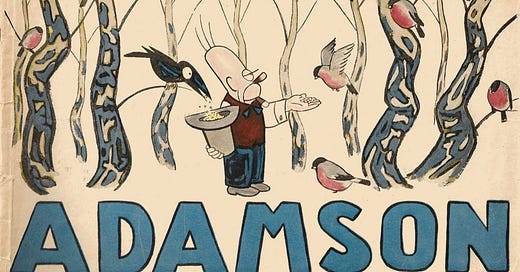Title: Heartfelt Laughter [de: Von herzen lachen]
Author(s): Charlotte Kuhn-Behrens
“Der Weg” Issue: Year 2, Issue 2 (February 1948)
Page(s): 94, 104
Dan Rouse’s Note(s):
Der Weg - El Sendero is a German and Spanish language magazine published by Dürer-Verlag in Buenos-Aires, Argentina by Germans with connections to the defeated Third Reich.
Der Weg ran monthly issues from 1947 to 1957, with official sanction from Juan Perón’s Government until his overthrow in September 1955.
Source Document(s):
[LINK] Scans of 1948 Der Weg Issues (archive.org)
Heartfelt Laughter
Charlotte Kuhn-Behrens
Perhaps there are few things in life we should take as seriously as cheerfulness. Laughter is a mighty force of emotional liberation, the outward sign of a strong, self-assured personality. Though folk wisdom has long passed down the saying that
“you can spot a fool by their constant laughter,”
what’s really meant here is the shallow, forced, silly kind of chuckle—nothing at all like the quiet, grounded joy of someone so sure of themselves that they can simply laugh. In this light, we’re reminded of the famous Homeric laughter—that bold, heroic mirth of figures rightly admired. And so, a truth reveals itself: only those who can weep are truly able to laugh from the heart.
This last thought might strike a particular chord with men. So many live under the mistaken ideal that showing natural emotion is somehow “womanly,” at odds with their sense of superiority. Of course, genuine tears aren’t the same as the often too-free-flowing sobs of some women. No, what matters here is the root of all growth: the raw, honest nature of feeling. Schopenhauer once put it strikingly:
„Je mehr der Mensch des ganzen Ernstes fähig ist, desto herzlicher kann er lachen. Menschen, deren Lachen stets geziert und gezwungen herauskommt, sind oft moralisch von leichtem Gehalt; wie denn überhaupt die Art des Lachens und andererseits der Anlaß dazu sehr charakteristisch für die Person ist.“
“The more a person can embrace true seriousness, the more heartily they can laugh. Those whose laughter always feels stilted or strained are often morally lightweight; indeed, how someone laughs—and what sets them off—says a great deal about who they are.”
The pure, unspoiled sensitivity of a person is the bedrock of their inner cheer. First, we must shed the tired old prejudice that feeling—especially when it’s worn openly—is a mark of weakness. The ability to feel is always strength. Picture a teenage boy, wild with love for a girl, yet covering it up with brash words and tales of adventures he’s likely never had. He does it out of fear—fear of being seen as tender, and so, mocked. Many men still carry this notion, at least to some degree, and it leaves them vulnerable to stiffness, to a creeping falseness in their emotions that later spills out in the wrong places, at the wrong times.
By contrast, let’s turn back to that Homeric laughter. Achilles was a hero who, like all of Homer’s greats, could laugh—and it’s no surprise that we’re told how he wept loudly by the sea’s edge for his lost love, Briseis. People need to break free from the dread of losing control when they let their true feelings speak. Too often, these fears trick us into missing what’s essential, burying the path to ourselves. And that might be the worst thing of all, because only those who find their way to their own heart can laugh from it—and, in doing so, master life and its struggles.
That Homeric laughter, the humor of Wilhelm Busch and Fritz Reuter, springs from this calm self-possession, from a breadth of feeling that already holds sway over personal flaws and others’ quirks, unshaken by life’s little shortcomings. Humor, it seems, is a special gift of the Nordic peoples. Their laughter, for instance, has little in common with an Asian smile, flowing as it does from a wholly different well of the spirit. Many of the world’s great humorists hail from this Nordic stock—think of the divine comedy in Shakespeare’s plays or the cartoonist Oscar Jacobsson, whose “Adamson” won global fame. The northern folk have a natural knack for cheerfulness.
It might sound odd, then, to say that heartfelt laughter hinges on a healthy love life. Yet here we touch the primal root, the wellspring of everything. Not just for women, but for all people, a thousand woes and sighs can be healed from this one source. True, healthy feeling—the kind that’s lived, not just burned off or played out—must shape and define how men and women relate. Real passion, real love, clear of dull or hollow shades, will lead us to a vivid ability to feel and seize life fully. Then, those awkward pub-table guffaws and the childish glee over flat jokes will fade on their own, giving way to genuine humor. That sort of wisecracking is usually just a vent for bottled-up emotions, far removed from the kind of laughter that truly sets us free. “Those who love can laugh…”—there’s the whole wisdom of it.
If we want to guide people to real cheer, they need, above all, a fierce will to be themselves—to find a joy that starts with laughing at their own expense, turning toward life’s brighter, bolder side. Spending time with truly fine humorous books can do wonders here. We ought to take laughter seriously and meet life’s hardships with a smile.




